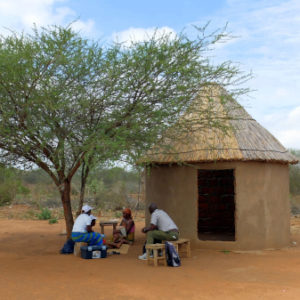Unitaid has awarded a US $ 25.3 million grant to the Barcelona Institute for Global Health (ISGlobal) for a project that seeks to reduce malaria transmission
Global efforts to fight malaria have hit a plateau and new tools that complement those currently in use are needed to achieve global malaria goals. In this context, the Barcelona Institute for Global Health, ISGlobal, has been awarded a US$ 25.3 million grant from Unitaid to evaluate mass drug administration (MDA) of ivermectin to humans and livestock in two countries—Tanzania and Mozambique—to kill the mosquitoes that transmit malaria. ISGlobal will lead a consortium that includes the Centro de Investigação em Saúde de Manhiça (CISM), the Ifakara Health Institute, the University Hospital Bern, the University of Oxford, and Virginia Tech.
“Vector control, our most effective strategy, is now doubly threatened by widespread insecticide resistance and residual transmission,” says Regina Rabinovich, principal investigator of BOHEMIA, director of the Malaria Elimination Initiative at ISGlobal, a centre supported by “la Caixa”, and ExxonMobil Malaria Scholar at Harvard University. “We need innovative thinking on how to prevent malaria if we want to make progress towards the goals proposed by WHO in the Global Technical Strategy for Malaria 2016-2030.”
The grant awarded by Unitaid will enable the consortium to advance the development of a new strategy to reduce malaria transmission based on ivermectin mass administration. BOHEMIA (Broad One Health Endectocide-based Malaria Intervention in Africa) is a four-year project that will conduct two clinical trials in different eco-epidemiological settings in east and southern Africa, specifically Tanzania and Mozambique. Ivermectin will be distributed in mass drug administration campaigns to humans and livestock, for two consecutive years.
The project will generate evidence on four different aspects—efficacy, safety, social science, and environmental impact—to support regulatory guidance, global and national policy change. Should evidence be supportive, engagement with WHO and other key stakeholders will support policy and implementation of ivermectin as an innovative vector control strategy for malaria control and elimination. By engaging industry early in the process, the project also aims to facilitate increased supply from at least two manufacturers if the malaria intervention is recommended.
The innovative One Health approach also offers an opportunity for preventing neglected tropical diseases in humans. “Delivery to livestock has a positive impact on households. It reduces the burden of intestinal helminths and ecto-parasites in domesticated herds, thereby increasing income and food security,” adds Carlos Chaccour, chief scientific officer of BOHEMIA, ISGlobal researcher and professor at the University of Navarra. “Indeed, these additional benefits would represent a step towards achieving the Sustainable Development Goals.”

Laura Delgado / BOHEMIA






